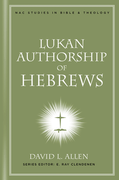 This week I’ve been studying one of my favorite biblical books, the Letter to the Hebrews. In the course of my study over the years, I’ve come across the work of David L. Allen. He’s written several things on Hebrews, most notably a commentary in the in New American Commentary series.
This week I’ve been studying one of my favorite biblical books, the Letter to the Hebrews. In the course of my study over the years, I’ve come across the work of David L. Allen. He’s written several things on Hebrews, most notably a commentary in the in New American Commentary series.
However, more recently, Allen–who is dean of the School of Theology, professor of Preaching, and director of the Center of Biblical Preaching at Southwestern Baptist Theological Seminary (SWBTS) in Fort Worth, Texas–has published a work that will surely be considered helpful by some and controversial by others. Allen’s book is titled, Lukan Authorship of Hebrews.
In this book, Allen argues that Luke independently wrote Hebrews from Rome, c.AD 67, approximately 5 or 6year after writing Luke-Acts. He wrote it shortly after Paul’s death to a group of former Jewish priests (cf. Acts 6:7) who had relocated to Antioch.
Here is the outline of his arguments:
1. Patristic Evidence:
- Some believed Hebrews was Luke’s translation of Paul’s letter;
- Others believed Hebrews was Luke’s independent work (this was based on linguistic similarities between Hebtrws 7 Luke-Acts and Luke’s close association with Paul).
- No one argued Luke couldn’t have written Hebrews because f a Gentile background.
- Linguistic evidence by Delitzsch and Alexander confirm patristic views.
2. Evidence for and against Paul, Barnabas, and Apollos:
- No extant writings from Barnabas and Apollos means no linguistic evidence is possible.
- Only Tertullian proposed Barnabas as the author of Hebrews in the patristic era.
- Luther was the first to propose Apollos as the author.
- some external evidence and internal, linguistic evidence point to Paul, but the church fathers noted significant differences as well.
- Majority of NT scholars today reject Pauline authorship of Hebrews.
3. Linguistic Evidence for Lukan Authorship:
- Vocabulary and style of Hebrews is more like Luke-Acts than any other book.
- Similarities in prologue, linguistic, and semantic parallels in Acts 7 and Hebrews 11.
- Similarity and use of chiasm, parallelism as over-arching framework in Hebrews and Luke-Acts.
- Luke was skilled enough/capable of writing Hebrews.
4. Similarity of Purpose in Hebrews and Luke-Acts:
- Concept of the “the Word” and “hearing of the Word.”
- Pastoral concern.
5. Substantial Agreement in Theological Outlook of Hebrews and Luke-Acts:
- Primarily in Christology, eschatology, and prophetic fulfillment.
- Other areas (e.g., Jesus as High Priest).
6. Luke’s Jewish background and Interest:
- Many argue Luke has too much of a Gentile background to write Hebrews.
- Evidence suggests Luke was Jewish by birth.
- Exegetical and hermeneutical skills seen his use of the Old Testament.
- Use of the Old Testament in Luke-Acts is consistent with its use in Hebrews.
- Quotation formulas used in Hebrews and Luke-Acts are remarkably similar.
So, is Allen right? Well, he makes a pretty compelling case, if you consider this caveat that he gives: “The cumulative effect of the evidence implicating Luke’s is substantial. If the field of suspects for authorship is narrowed to include only those who are New Testament writers, then the evidence points to Luke” (emphasis mine). If we limit our options to biblical authors only, then yes, Luke does seem like the best candidate. But that makes us ask the question, ‘Should we only limit our possibilities to known authors of the New Testaments?’
I’m not sure. So, I will simply defer to Origen’s famous statement on Hebrews’ authorship: only “God knows” for sure.


My mother who is 89 years of age and a spirit filled believer and a daily student of the Word since my birth ( I am 61) says Luke authored Hebrews. Although she has never been to seminary, she states many of the reasons you have outlined by the power of the Holy Spirit.